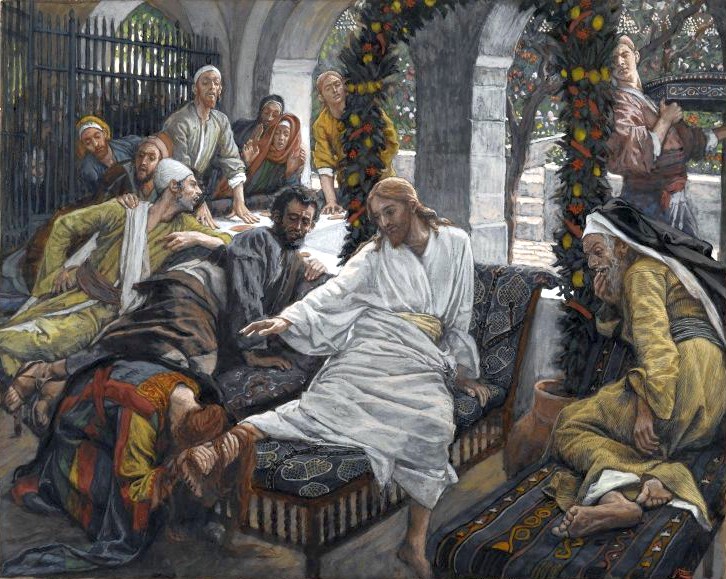.
But one of his disciples, Judas Iscariot, who was later to betray him, objected,
“Why wasn’t this perfume sold and the money given to the poor? It was worth a year’s wages.”
So much conveyed in those twenty-two words. Unmoved by her tears, by her worshipful wiping of Jesus’ feet with her hair, Judas—whom John reminds us will later betray Jesus—criticizes her action. Financier J. P. Morgan, experienced in dealing with people seeking money, said “A man always has two reasons for doing anything: a good reason and the real reason.” It may not always be true, but here it certainly is. Judas objects that the money—a year’s income—might have been spent on the poor. That was his good reason. John informs us of the real reason.
He did not say this because he cared about the poor but because he was a thief; as keeper of the money bag, he used to help himself to what was put into it.
Oscar Wilde described a cynic as “’a man who knows the price of everything and the value of nothing.” It is an apt description of Judas here. Focused on money, that’s all he sees in Mary’s actions: blind to the larger reality, oblivious to his own motives, and to the tragic part he will soon play in this cosmic drama. What a contrast! An act of amazing devotion and love from one who sees Jesus’ peril, opposed by the very man who will seal Jesus’ capture and execution!
This should serve as a cautionary tale for today. We live in a culture of “Compassion Pharisees,” where many who proclaim their concern for the poor and suffering in the public square do so like Judas, as cover for their own greed or appetite for power. It sounds good, but then, so did the Pharisees in Jesus’ day.
But Jesus can read hearts.
“Leave her alone,” Jesus replied. “It was intended that she should save this perfume for the day of my burial. You will always have the poor among you, but you will not always have me.”
This explains it all. For some time, Jesus has been telling the disciples that he must soon die. But because it does not match their expectations for the Messiah, they fail to comprehend that the time is rapidly approaching. Mary has also heard. Everything. And though she may not have understood everything, she understood enough.
Meanwhile a large crowd of Jews found out that Jesus was there and came, not only because of him but also to see Lazarus, whom he had raised from the dead.
So the chief priests made plans to kill Lazarus as well, for on account of him many of the Jews were going over to Jesus and believing in him.—v. 10-11.
We cannot say for certain that she knew of these plans. But her actions in this episode suggest that she sensed the crisis looming, the menace to both her brother, and to her Lord. Jesus says directly that the perfume had been intended for his burial. It appears she wanted to express her love and sympathy for Jesus while he yet lived, perhaps to tell him she saw what was coming, as an encouragement that his approaching sacrifice would not be unappreciated.
As we saw with the Woman at the Well, John’s gospel often focuses on contrasts, and in this episode, Mary’s foresight, faith, and love contrast drastically with the blind greed of Judas, and the murderous intent of the Jewish leadership. Mary of Bethany and Judas both believed in Jesus’ great power, but they reacted in drastically different ways. Judas shared the idea of Jesus as leader against the corrupt power structure in Jerusalem, Jewish as well as Roman. He thought Jesus just needed a little nudge, to get him to exercise his power. That’s clear from his reaction when he realized Jesus would allow himself to be crucified. Matthew tells us:
When Judas, who had betrayed him, saw that Jesus was condemned, he was seized with remorse and returned the thirty pieces of silver to the chief priests and the elders.
“I have sinned,” he said, “for I have betrayed innocent blood.”—Matthew 27:3-4.
“When he saw that Jesus was condemned. . . .” Well, what had he expected? Everyone knew the Jewish leaders had been plotting to kill Jesus for months. Judas betrayed Jesus into their hands, and they condemn him. Again I ask, “What did he expect?” The answer clearly is—something else! It seems likely he expected Jesus to assert his power and authority to escape capture. Judas perhaps saw his action as a catalyst to start a revolution.
Mary, alone of those close to Jesus, appears to have absorbed his teaching, had a glimpse of his true mission. She alone took the initiative to bring him comfort in the days just before his greatest trial.
In both Old and New Testaments, incense in the Temple represents the prayers of the saints. Here, in a private home in Bethany, the fragrance of perfume, and of Mary’s devotion, “filled the house.” And whenever this story is told, that wonderful scent lingers to this day.










